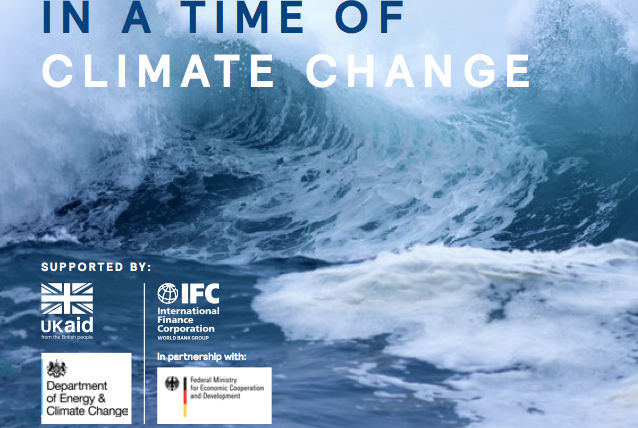I can’t remember how long ago people started asking me what I thought would be the best way to wean ourselves off of fossil fuels. I always said it would be with a fee on carbon. Economists have been saying this for a long time as well.
There has been one truism in American politics that the third rail has been to NEVER be a proponent of a gas tax hike. This has always been a career destroyer. Now, all of a sudden, this tenant is beginning to crumble!
As the following article points out, “it will be a seismic event” for the American Petroleum Institute (API) to advocate for a price on carbon.
The idea is also getting traction on Capital Hill. Even Mitt Romney has said he’d be open to this.
While the devil is in the details, the simple fact that this tool for fighting climate chaos is becoming a real possibility and having industry backing is a game changer.
Boy, the times they are a changing. And as I am like to say, buckle up! The pace of climate change actions is increasing exponentially.
“”API supports economy-wide carbon pricing as the primary government climate policy instrument to reduce CO2 emissions while helping keep energy affordable, instead of mandates or prescriptive regulatory action,” the draft statement says, according to the Journal.”
“Many of the group’s most diversified, internationally operating member companies have already come out in favor of carbon pricing, including Exxon Mobil Corp., BP PLC, Royal Dutch Shell PLC and ConocoPhillips.”
“Business Roundtable and the Electric Power Supply Association have come out in favor of a price on carbon in recent months, while the U.S. Chamber of Commerce signaled support for a “market-based approach” to reducing greenhouse gas emissions in January (E&E Daily, Jan. 20).”
“Climate Leadership Council’s proposal to tax carbon emissions and pay the proceeds as dividends to taxpayers.”
“”If that happens, because most of corporate America already supports climate action, the outstanding question is: Will the environmental community tackle climate policy alone, or will industry and environmental interests tackle it together?””
API Weighs Support for Carbon Pricing
Nick Sobczk and Timothy Cama, E&E Reporters
March 2, 2021
The American Petroleum Institute is considering whether to back carbon pricing, a potentially major move for a longtime enemy of climate change policy.
API has drafted a statement saying that it supports the policy because it would “lead to the most economic paths to achieve the ambitions of the Paris Agreement,” The Wall Street Journal reported yesterday.
“API supports economy-wide carbon pricing as the primary government climate policy instrument to reduce CO2 emissions while helping keep energy affordable, instead of mandates or prescriptive regulatory action,” the draft statement says, according to the Journal.
An official confirmed that carbon pricing is under discussion, though API has not made a formal announcement about whether it will back the policy.
If API ultimately does move forward with the statement, it would be a momentous change of direction for an organization that has for years been a leading foe of climate policy on Capitol Hill, including the 2009 Waxman-Markey cap-and-trade bill.
It would follow other similar announcements by major trade organizations, as the Democratic Congress and President Biden look to aggressively fight climate change and reduce greenhouse gas emissions.
“For the better part of a year, API has convened top industry officials throughout the supply chain to incubate a host of policy solutions and industry actions to shape a lower carbon future,” Megan Bloomgren, API’s senior vice president of communications, said in an emailed statement last night.
API’s efforts, Bloomgren added, “are focused on supporting a new U.S. contribution to the global Paris agreement.”
Mike Sommers, chief of staff to former House Speaker John Boehner (R-Ohio), became API chief executive in 2018.
Business Roundtable and the Electric Power Supply Association have come out in favor of a price on carbon in recent months, while the U.S. Chamber of Commerce signaled support for a “market-based approach” to reducing greenhouse gas emissions in January (E&E Daily, Jan. 20).
It’s unclear if API would explicitly call for a halt to executive branch regulations as part of its new position. But that trade-off has been key to recent support for carbon pricing by big business, such as the Climate Leadership Council’s proposal to tax carbon emissions and pay the proceeds as dividends to taxpayers.
Like other major industry groups, API does support federal regulation of methane, a powerful greenhouse gas emitted by the oil and gas sector.
“If API endorses pricing carbon emissions, it will be a seismic event — the ground shifting under the climate policy debate,” said Alex Flint, executive director of the pro-carbon tax group Alliance for Market Solutions.
“If that happens, because most of corporate America already supports climate action, the outstanding question is: Will the environmental community tackle climate policy alone, or will industry and environmental interests tackle it together?”
API signaled a potential shift on carbon pricing in January, backing “market-based policies” to reduce greenhouse gas emissions in its annual policy report and specifically naming carbon pricing as a possible policy.
Many of the group’s most diversified, internationally operating member companies have already come out in favor of carbon pricing, including Exxon Mobil Corp., BP PLC, Royal Dutch Shell PLC and ConocoPhillips.
But France-based Total SE left API in January, citing in part the organization’s decision at that point not to call for carbon pricing (Greenwire, Jan. 15).
Environmental groups, however, are sure to be skeptical of any effort by API to appear green, particularly progressives who call for ending fossil fuel production altogether. API has lobbied against climate and other environmental regulations for years.
“The API’s move would be little more than a public relations ploy, and the Biden administration shouldn’t be taking policy cues from the standard polluters’ playbook,” Maya Golden-Krasner, deputy director of the Center for Biological Diversity’s Climate Law Institute, said in a statement.
This story also appears in E&E Daily and Climatewire.



